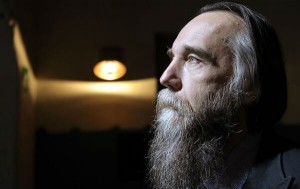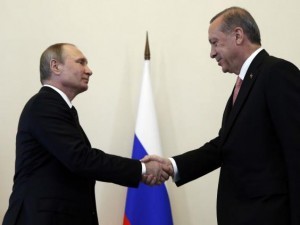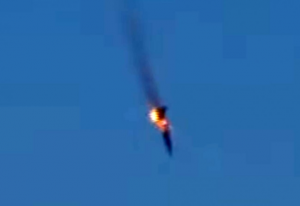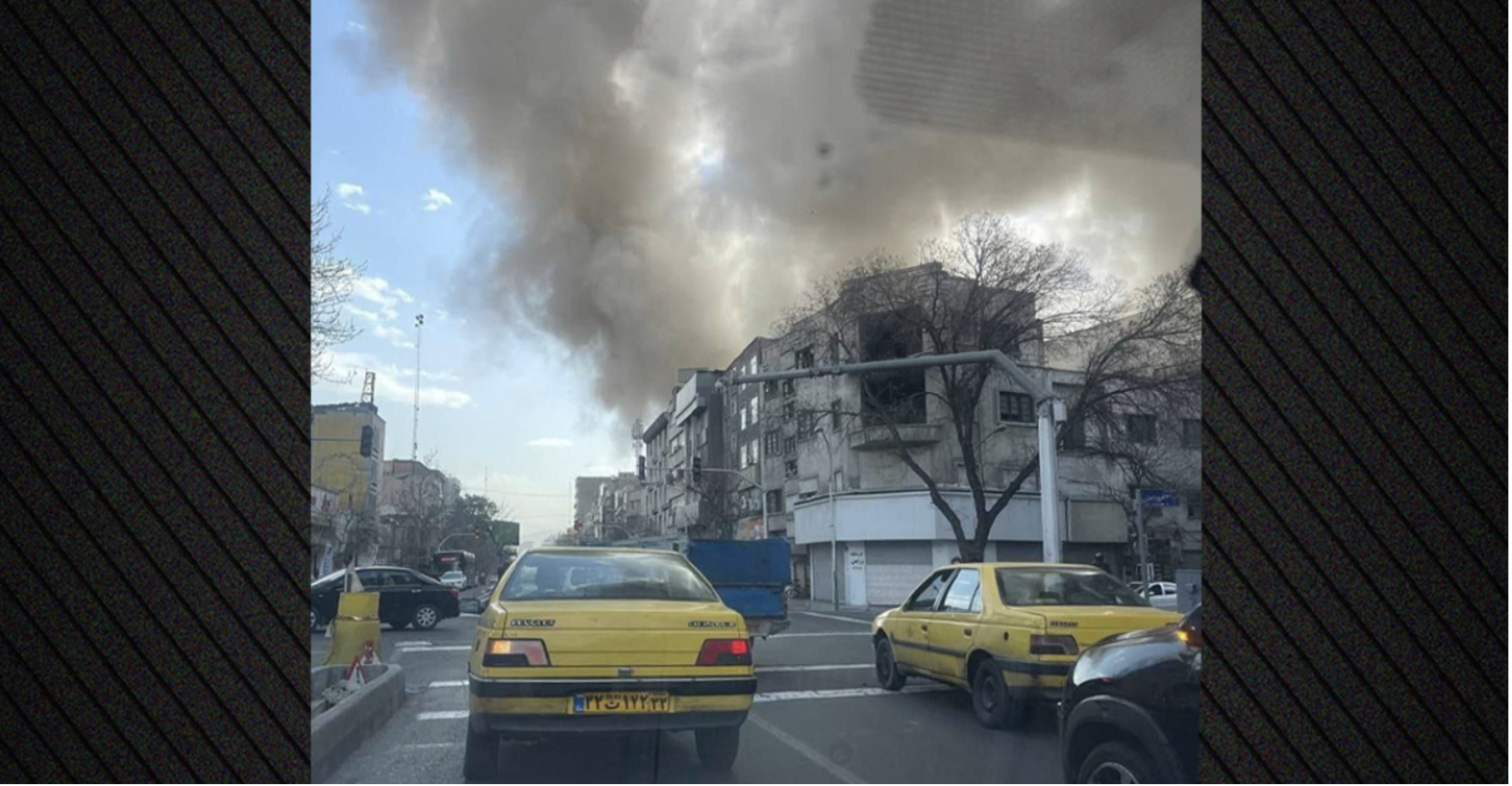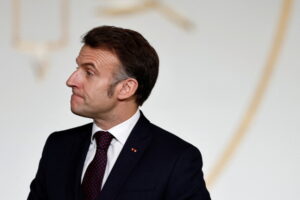The Russian ultra-nationalist dubbed “Putin’s Rasputin” by Breitbart News when it was run by President Donald Trump’s chief strategist, Steve Bannon, has emerged as an unlikely foreign-policy fixer for the Kremlin.
Alexander Dugin, whose bushy beard gives him a passing resemblance to the Siberian mystic who bewitched the last czar’s family, says he played a key but largely clandestine role in patching up Russia’s relations with Turkey, an account confirmed by a senior figure in Ankara. And with people he calls ideological allies now in the White House, Dugin says he’s bullish on better ties with the US, too.
After Turkey shot down a Russian warplane along the Syrian border in 2015, prompting “World War III” to trend on Twitter, the firebrand philosopher used his contacts in both countries to form a backchannel that helped Vladimir Putin and President Recep Tayyip Erdogan end an increasingly dangerous feud, according to a retired Turkish general who flew to Moscow for secret talks.
The rapprochement allowed Putin to outmaneuver the Obama administration and turn the tide in Syria’s civil war on behalf of Bashar al-Assad. For Dugin, whose views on the evils of liberalism have been cited by Bannon and other far-right leaders, it also moved Russia a step closer to fulfilling his vision of unwinding the US-led global order, in part by luring Turkey away from NATO and creating a “Russo-Islamic pact” that includes Iran.
Dugin, the son of a Soviet military-intelligence official, said being independent makes him an effective go-between in matters of state. The 55-year-old rabble-rouser, blacklisted by the US for aiding the insurgency in Ukraine, has no official post. But he has advised a member of Putin’s inner circle and written a textbook on geopolitics that’s been used by the military.
“I can talk to people like an official can’t,” Dugin said in his Moscow office at Tsargrad TV, where he’s a commentator and chief editor. “A diplomat says what he’s told. What does a military man say? Even less. And an intelligence officer? Nothing at all. You don’t understand where the truth lies. I speak from the perspective of geopolitics. That’s why the Turks started to trust me.”
Dugin, who’s been described as everything from an occult fascist to a mystical imperialist, lost his prestigious job running the sociology department at Moscow State University in 2014 after activists accused him of encouraging genocide. Thousands of people signed a petition calling for his removal after a rant in support of separatists in Ukraine in which he said, “kill, kill, kill.”
The Kremlin, which gave the prolific polemicist prominent airtime on the biggest networks to cheerlead during the annexation of Crimea in 2014, has kept him at arm’s length since he criticised Putin for not taking more of Ukraine. When asked if Dugin played a role in the detente with Turkey, Putin’s spokesman, Dmitry Peskov, said, “No.”
“He’s seen as a brilliant philosopher, but brilliance and madness are very close to each other,” said Sergei Markov, a political consultant to Putin’s staff. Even though Dugin’s not an official envoy, Markov said, “he appears to have given the Turks some very good advice.”
Dugin made “everyone happy” by organizing a November visit to Crimea by a Turkish delegation that included one of Erdogan’s cousins, a few weeks after meeting Prime Minister Binali Yildirim in Ankara, Markov said. The trip was a major fillip for Russia’s efforts to gain recognition for Putin’s annexation of the Black Sea peninsula, which provoked US and European sanctions.
“Incredibly beautiful—one of the best moments of my life,” Dugin said after Trump’s inauguration.
Dugin’s writings, in dozens of books and countless blogs, have made him an influential thinker not only in Turkey, but also Iran, where’s he’s a frequent visitor, and among anti-establishment parties that are on the rise throughout the West, a trend that is welcomed by Russia’s leadership.
Apart from Turkey “only two countries really pay attention to me—Iran and the US,” Dugin said.
The foreword to one of his books was written by a retired US.professor, Paul Gottfried, a Trump supporter who was among the first political philosophers to use the term “alternative right” to describe the radical conservative movement. In July 2016, a month before he joined the Trump campaign, Bannon described Breitbart as “the platform for the alt-right.”
In a video address to a Vatican conference in 2014, Bannon, whose White House role has been elevated to include a seat on Trump’s National Security Council, defended the traditionalist views espoused by Dugin and other nationalists who want “sovereignty for their country.” Dugin said he’s never met Bannon.
Dugin’s role in resolving the crisis with Erdogan over the jet incident was confirmed by Ismail Hakki Pekin, a former head of Turkish military intelligence. He was one of five members of the Patriotic Party, including a fellow retired general and a retired admiral, who flew to Moscow in December 2015 for four days of meetings that Dugin arranged with current and retired Russian officers.
During the visit, Dugin took the Turkish delegation to a “secret room” in a “special place” to meet his benefactor, Konstantin Malofeev, a multimillionaire with ties to the Russian Orthodox Church, Pekin said in an interview in Ankara.
Dugin and Malofeev, who’s also under US sanctions for supporting the revolt in Ukraine, started Tsargrad, an old name for Constantinople, in 2015 and the TV channel now has some 20 million viewers. It was the only major station to carry a speech former Trump adviser Carter Page gave in Moscow last year.
Pekin said Dugin introduced Malofeev as Putin’s “right-hand man,” and the Turks came to learn the financier really can “knock on Putin’s door.”
“That’s how the trip became effective,” Pekin said. “We knew what we said went directly to Putin.”
And what they said was that Erdogan had nothing to do with downing the bomber the previous month. Pekin said he and his colleagues were successful in convincing the Russians they spoke with, including two plainclothes generals, that rogue elements in the military were responsible for the shootdown.
It was a “conspiracy” involving followers of Fethullah Gulen, a reclusive cleric based in Pennsylvania, and US and NATO officials who wanted to drive a wedge between Russia and Turkey, said Pekin, who briefed senior diplomats and military officials in Ankara after the Moscow trip.
Pekin said Dugin had sought out the two retired Turkish generals and former admiral specifically because they all had a history opposing Erdogan and spent time in jail for alleged plots to overthrow the government, which made them more credible in the eyes of their Russian interlocutors.
In March, with tensions between Putin and Erdogan still simmering, Dugin flew to Ankara for a follow up visit that included talks with relatives of Erdogan and other influential figures.
Dugin said he told the Turks that arresting the person accused of shooting dead one of the Russian pilots as he tried to parachute to safety would go along way toward re-establishing relations. The next day, on March 30, the suspect was taken into custody in the eastern city of Izmir.
“They said they were carrying out an investigation and that Erdogan would apologize,” said Dugin, who passed on the information to Russian officials.
Three months later, on June 27, with Turkey’s economy squeezed by the trade curbs Russia introduced after the shootdown, Erdogan finally expressed regret for the incident, paving the way for a resumption of ties.
But less than three weeks later, on July 15, something Malofeev and Dugin warned about back in that “secret room” came true—an attempted coup by disgruntled members of the military, according to Pekin.
Malofeev dismissed the assertion he’s Putin’s right-hand man as “a flattering exaggeration.” Peskov, the Kremlin spokesman, denied the financier played a role in the rapprochement with Turkey.
Dugin, a dissident in the 1980s who co-founded the National Bolshevik party after communism ended, was in Ankara at the time of the military revolt. He gave a series of TV interviews in support of the Turkish leader’s decision to mend ties with Russia, the last of which, at state-run TRT Haber, concluded just 2 1/2 hours before the coup plotters seized the station.
Erdogan blamed Gulen and his U.S. benefactors for the putsch, responding with a sweeping crackdown of suspected Gulenists that has upended society and driven Turkey and Russia closer together. The re-energized partnership was put to the test in December, when Russia’s ambassador to Turkey was assassinated by a police officer in Ankara.
“That was the last attempt by the outgoing US administration and the globalists to disrupt Russia’s rapprochement with Turkey,” Dugin said.
Dugin has delighted in watching Russia and Turkey take the reins in resolving the Syrian crisis, elbowing the US aside.
Erdogan, with Putin’s blessing, sent troops into Syria in August to fight Islamic State and US-supplied Syrian Kurdish YPG forces, which Turkey views as terrorists for their links to autonomy-seeking PKK rebels. In return, Turkey blocked rebel supplies into Aleppo, enabling Assad’s forces, backed by Russian firepower, to capture the former commercial capital in December. In January, the two leaders started joint air strikes against Islamic State targets.
Dugin, who has long predicted the demise of “the West’s liberal hegemony,” said the election of Trump has been a watershed development that promises to change the course of world history.
“Incredibly beautiful—one of the best moments of my life,” he said after Trump’s inauguration.
After decades of railing against Washington for seeking the “Westernization of all of humanity,” Trump’s elevation has led to a Damascene conversion for Dugin, who declared anti-Americanism “over.”
“America not only isn’t an opponent, it’s a potential ally under Trump,” he said.
Now Dugin’s focusing on Europe, where he’s been cultivating ties with anti-establishment parties that threaten a political and military union seven decades in the making.
With key elections in France, Germany and the Netherlands this year, the Russian polemicist has a new mantra for Europe that’s ripped straight out of Trump’s campaign playbook:
“Drain the swamp.”
Source: independent.co.uk
Ask me anything
Explore related questions
